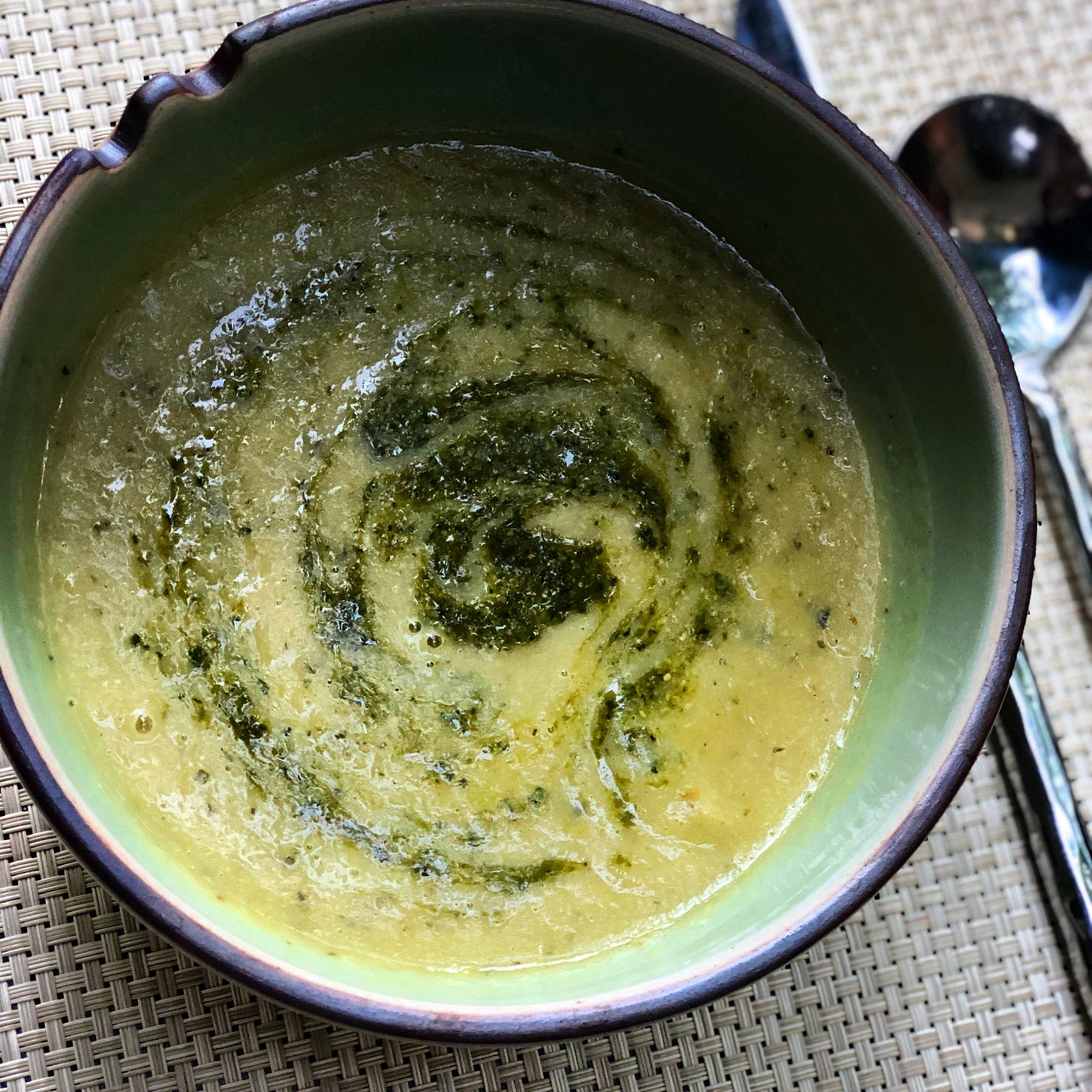Seeing is believing
and a recipe for a summery zucchini soup
Attention is the rarest and purest form of generosity.
— Simone Weil, Waiting for God
It’s a universally acknowledged truth that screens have taken over our operating systems.
Even if we have the discipline to leave our phones charging in the kitchen (✅), don’t use Uber Eats or Door Dash (✅), wear actual watches instead of mini computers on our wrist (✅), or have a clock radio to wake us up (✅), the inevitability of our reliance on devices is near-complete.

What gets lost in this reliance is not just neck strain and half a pound of extra weight in our pockets. It’s the short burst of distraction that happens mid-meal, mid-conversation, mid-sentence. And with every glance away, a tiny fissure starts to widen in the interaction, rendering connections more fragile and tenuous.
Putting down roots
Simone Weil was a French philosopher, political activist, and mystic whose writings continue to be studied across philosophy, theology, political theory, and activism. Known for her radical commitment to justice, her deep concern for human suffering, and her refusal to separate thought from action, she explored themes of attention, obligation, justice and spiritual longing that continue to illuminate what it means to be fully human.
In her book The Need for Roots, Weil wrote that humans must feel connected—to a place, a tradition, a community—to truly thrive. Then, as now, Weil saw how modern society uproots people: through war, colonization, work, or cultural disruption.
For Weil, ethics was not about abstract ideals — it was about being present to another person with full awareness. She believed that when we attend to another in their vulnerability, their suffering, or even their silence, we affirm their existence. We say, in effect: I see you. I am with you. You matter.
Seeing is believing
It’s an important truth, but not one confined to philosophy. Now and then, it shows up in everyday places — even in a romantic film.
In the film Shall We Dance?, Susan Sarandon’s character, Beverly Clark, delivers a thoughtful observation about why people marry:
“We need a witness to our lives. There’s a billion people on the planet — what does any one life really mean? But in a marriage, you’re promising to care about everything… You’re saying ‘Your life will not go unnoticed because I will notice it. Your life will not go unwitnessed because I will be your witness.”
It’s framed as a reflection on romantic partnership, but its truth reaches far deeper — into the core of what it means to be human. To live a life that is truly seen, not just performed. To be known in the ordinary, not only in our highlights. To not break eye contact or glance away to the screen or the ping, the next email coming in. To be silent, and in that silence, to form deeper roots.
In those quiet moments of presence, both Weil and Beverly remind us: to witness someone — not to fix them, change them, or use them, but simply to be with them — is an act of love. Maybe even the most essential one.
Did you know that clicking the ❤️ at the top or below helps more readers discover Delicious Bits? It’s like seasoning — a small thing that makes a big difference.
Zucchini and pea soup with pesto
from Italy al Dente, Biba Caggiano
serves 6
In this hot, hazy weather, it’s hard to pay attention to anything that requires much effort beyond tossing together a summer salad. But this one from the archives will hit just right when the annual parade of zucchini starts coming our way. Yes, fresh peas are past, but this is the time to reach for frozen, not just for convenience, but because peas really do seem to be captured at their height of flavour.
Although inextricably associated with Italian food, and Liguria in particular, it’s thought that basil likely originated in India. No matter. Basil is firmly rooted in Ligurian cuisine, most famously with pesto alla Genovese.
Even if you don’t make your own pesto, don’t skip pesto in this recipe. The unmistakable aroma and deep flavour of basil pesto is essential to truly make this zucchini soup shine. But you can skip the prosciutto to make this a lovely vegan option.
Ingredients
⅓ extra virgin olive oil
1 cup finely minced onion
⅛ pound (56 gr) prosciutto, finely minced
2 pounds (900 gr) zucchini, ends trimmed, cut into small dice
1 cup fresh or frozen peas (if frozen, thaw the peas)
6 cups vegetable or chicken broth
Salt and pepper to taste
½ cup basil pesto, more or less to taste (store bought is fine)
Heat the oil in a large pot over medium heat. Add the onion and cook, stirring, until the onion is lightly golden, 5-7 minutes. Add the prosciutto and continue cooking for a few minutes more; you don’t want the prosciutto to crisp.
Raise the heat to medium high and add the zucchini and fresh peas (if using thawed frozen peas, they will be added later). Sauté for 5 minutes, and then add the broth, season with salt and pepper and bring to a gentle simmer.
Reduce the heat to low and simmer the soup, uncovered, for 30 minutes. If using thawed frozen peas, add them at this point. Turn the heat off and let the soup rest for 15 minutes.
In a blender, purée the soup in batches until smooth.
Serve the soup at room temperature or slightly warm. Before serving, swirl a generous teaspoon of pesto into each bowl.




I feel like those of us over a certain age (ie didn’t grow up with cell phones) actually long for the days when we didn’t feel so tied to emails, news, and every little reminder. Each week I set aside one day (usually either Sat or Sun) that I don’t look at my phone, check emails, or go on social media. I call it my “electronic sabbath,” lol 😂 It can be hard, especially if I’m traveling, but I find I get so much done and feel refreshed when I do.
Also, have you seen the original “Shall We Dance” film? It’s Japanese and IMO way better than the Sarandon/Gere version.
Ah, I just made pesto. I pretty much only eat it with pasta, though lately I’ve been spreading it on bread too (for sandwiches etc). I’ve never tried it in soup. I’m intrigued!